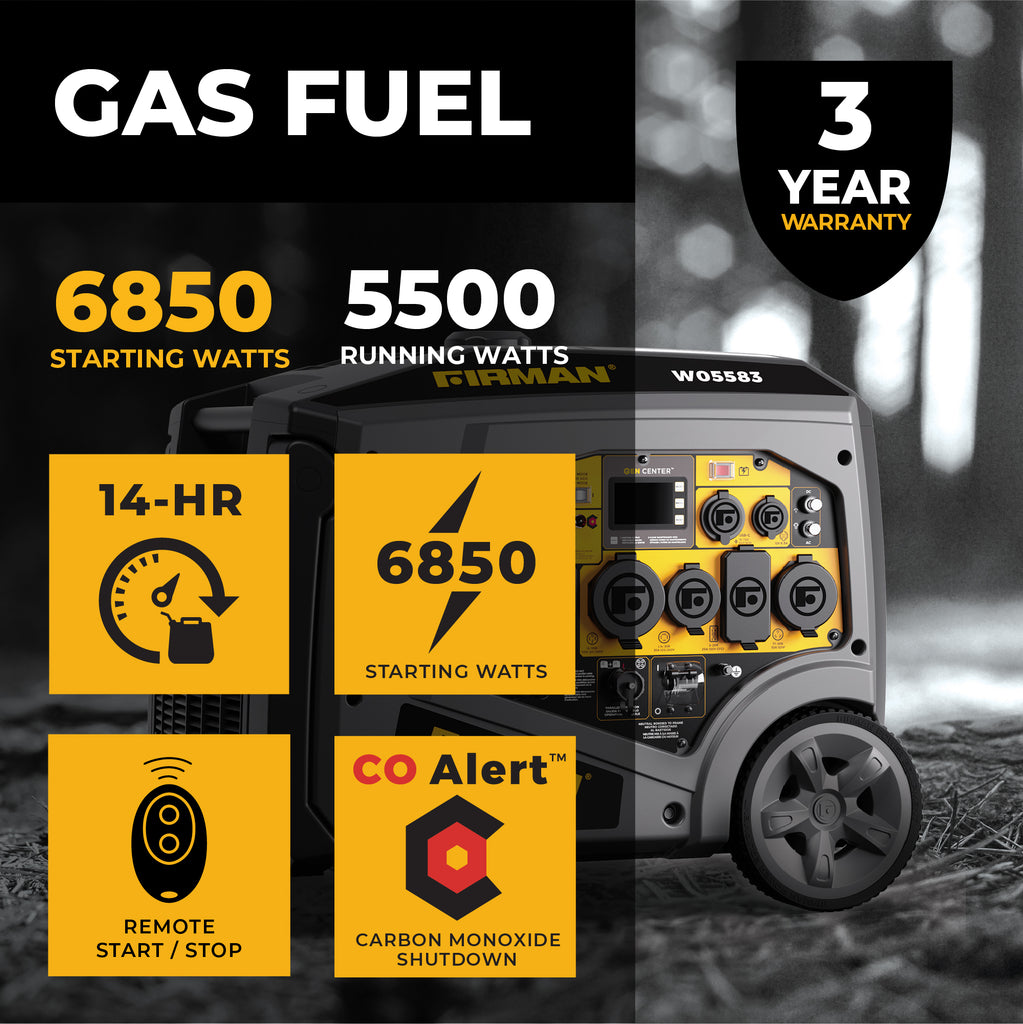Disclosure: This post contains affiliate links and I will be compensated if you make a purchase after clicking through my links. Learn More
A 5500-watt generator typically runs for 8-10 hours on a full tank of gas. This duration varies based on load and fuel efficiency.
Generators provide essential backup power for homes, businesses, and outdoor activities. A 5500-watt generator offers a good balance between power output and fuel efficiency, making it a popular choice. Fuel consumption depends on the generator’s load, with higher loads consuming more fuel.
Regular maintenance and proper usage can extend the generator’s run time. Understanding the fuel consumption rates helps in planning and ensuring uninterrupted power supply. Whether for emergency situations or recreational use, knowing how long a generator can run on a tank of gas is crucial for effective power management.

Generator Fuel Consumption
Understanding generator fuel consumption is crucial for effective usage. A 5500 watt generator can vary in fuel efficiency based on several factors. Knowing these factors helps in planning and maintenance.
Factors Affecting Fuel Consumption
Several key factors affect a generator’s fuel consumption:
- Load: Higher loads mean more fuel consumption.
- Fuel Type: Gasoline, diesel, and propane have different efficiencies.
- Maintenance: Well-maintained generators run more efficiently.
- Usage Pattern: Continuous use consumes more fuel than intermittent use.
- Environmental Conditions: Extreme temperatures can impact fuel efficiency.
Typical Fuel Usage For 5500 Watt Generators
A 5500 watt generator typically uses gasoline. Fuel consumption varies depending on load and generator model. Below is a table showing average consumption rates:
| Load Percentage | Fuel Consumption (Gallons per Hour) |
|---|---|
| 25% | 0.5 |
| 50% | 0.75 |
| 75% | 1.0 |
| 100% | 1.2 |
Let’s take a closer look at an example. If your generator has a 5-gallon tank:
- At 25% load, it will run for around 10 hours.
- At 50% load, expect about 6.6 hours of runtime.
- At 75% load, the runtime drops to 5 hours.
- At full load, it will run for about 4.1 hours.
These figures provide a general idea of what to expect. Actual results may vary based on specific conditions and generator models.
Tank Capacity And Duration
Understanding the tank capacity and duration of a generator helps you plan its usage. A 5500 watt generator is suitable for many home and outdoor needs. Knowing how long it runs on a tank of gas ensures you have enough power when needed.
Standard Tank Sizes
Generators come with different tank sizes. The standard tank sizes for a 5500 watt generator range from 3.5 gallons to 7 gallons. The size of the tank affects how long the generator can run.
| Tank Size (Gallons) | Average Running Time (Hours) |
|---|---|
| 3.5 gallons | 5 – 6 hours |
| 5 gallons | 8 – 10 hours |
| 7 gallons | 11 – 13 hours |
Expected Running Time
The expected running time depends on the tank size and load. A 5500 watt generator running at 50% load will last longer than at full load. For example, with a 5-gallon tank, it can run up to 10 hours at half load.
- At full load: Shorter running time
- At half load: Longer running time
Using a fuel-efficient generator can also extend the running time. Regular maintenance keeps the generator running efficiently. Always check the fuel level and plan for refills during long usage periods.
Read Also: How long will a predator 2000 generator run
Optimizing Generator Run Time
To get the best performance from your 5500 watt generator, you need to optimize its run time. This involves regular maintenance and proper load management. Both these practices ensure your generator runs longer on a single tank of gas.
Regular Maintenance
Regular maintenance is crucial for extending your generator’s run time. Clean the air filters to ensure smooth airflow. This helps the engine run efficiently. Check the oil level before each use. Low oil can damage the engine and reduce efficiency.
Replace spark plugs once a year. This ensures easy starting and smooth operation. Inspect fuel lines for cracks or leaks. Replace damaged lines immediately to avoid fuel wastage.
| Maintenance Task | Frequency |
|---|---|
| Clean Air Filters | Monthly |
| Check Oil Level | Before Each Use |
| Replace Spark Plugs | Annually |
| Inspect Fuel Lines | Monthly |
Proper Load Management
Proper load management helps maximize generator run time. Avoid overloading the generator. Overloading increases fuel consumption and reduces efficiency.
Use energy-efficient appliances. They consume less power and extend run time. Turn off devices that are not in use. This reduces the load and saves fuel.
- Unplug non-essential devices.
- Use LED lights instead of incandescent bulbs.
- Avoid using high-power tools unnecessarily.
Monitor the load using a wattmeter. This helps maintain an optimal load. Keeping the load within 75% of the generator’s capacity is ideal. It ensures the generator runs efficiently and uses less fuel.

Fuel Types And Their Impact
Choosing the right fuel type is crucial. It impacts how long your 5500 watt generator will run. Different fuels offer varying efficiencies and runtimes. Let’s explore the most common fuel types.
Gasoline
Gasoline is the most common fuel for generators. It’s easy to find and relatively inexpensive. A 5500 watt generator running on gasoline typically lasts 8-10 hours on a full tank. This duration depends on the generator’s load. Running at half load can extend the runtime.
| Fuel Type | Average Runtime (Full Load) | Average Runtime (Half Load) |
|---|---|---|
| Gasoline | 8 hours | 10 hours |
While gasoline is convenient, it has drawbacks. It’s volatile and has a shorter shelf life. Proper storage is necessary to prevent degradation. Always use fresh gasoline for optimal performance.
Alternative Fuels
Other fuels can also power your generator. Let’s discuss some common alternatives:
Propane: Propane offers longer shelf life and cleaner burning. A 5500 watt generator can run 10-12 hours on a 20-pound propane tank. Propane is also safer to store and handle.
Natural Gas: Natural gas provides an unlimited fuel supply if you have a connection. Runtimes can vary based on the generator and load. It’s an efficient and cost-effective option.
Diesel: Diesel fuel is more energy-dense than gasoline. A diesel generator can run longer on the same amount of fuel. Diesel engines are also more durable and require less maintenance.
Each fuel type has its pros and cons. Choose the one that best suits your needs and availability. Consider runtime, cost, and storage requirements.
| Alternative Fuel | Average Runtime (Full Load) | Average Runtime (Half Load) |
|---|---|---|
| Propane | 10 hours | 12 hours |
| Natural Gas | Varies | Varies |
| Diesel | Longer | Longer |
Real-world Examples
In the quest to determine the runtime of a 5500 watt generator on a tank of gas, real-world examples are invaluable. These examples offer practical insights beyond theoretical calculations. Let’s delve into some case studies and user experiences.
Case Studies
Case Study 1: John from Texas used his 5500 watt generator during a storm. He reported that the generator ran for 10 hours on a full tank of gas. John used it to power essential home appliances.
Case Study 2: Lisa from Florida utilized her generator for a camping trip. Her 5500 watt generator powered lights, a small fridge, and a fan. She noted a runtime of 12 hours on a full tank.
User Experiences
User Experience 1: An online forum user shared that their 5500 watt generator ran for 9 hours. They used it to power a heater and a few lights.
User Experience 2: Another user mentioned a runtime of 11 hours while using their generator for a construction project. The generator powered tools like drills and saws.
| Case/User | Runtime (hours) | Usage |
|---|---|---|
| John from Texas | 10 | Home appliances |
| Lisa from Florida | 12 | Camping trip |
| Online forum user | 9 | Heater and lights |
| Construction project user | 11 | Power tools |
Safety Considerations
Running a 5500 watt generator requires understanding key safety considerations. These ensure a safe and efficient operation. Proper handling avoids accidents and extends the generator’s life. Let’s delve into two crucial aspects: Safe Refueling Practices and Storing Fuel.
Safe Refueling Practices
Refueling your generator needs caution. Follow these steps for safe refueling:
- Turn off the generator and let it cool down. Hot surfaces can ignite fuel.
- Use a proper fuel container. Avoid spills and leaks for safety.
- Refuel in a well-ventilated area. This prevents buildup of harmful fumes.
- Keep a fire extinguisher nearby. Be ready for any emergencies.
Never refuel indoors. Always perform refueling outside to avoid risks.
Storing Fuel
Storing fuel properly is essential for safety and efficiency. Follow these guidelines:
- Use approved fuel containers. These prevent leaks and spills.
- Store fuel in a cool, dry place. Avoid direct sunlight and heat sources.
- Keep fuel away from living areas. Avoid storing it inside your home.
- Check for leaks periodically. Ensure your storage containers are intact.
Label your fuel containers clearly. This helps prevent misuse and accidents.
Proper storage and handling of fuel keep you and your generator safe.

Frequently Asked Questions
How Long Does A 5500 Watt Generator Run?
A 5500 watt generator typically runs for 8-12 hours on a full tank of gas, depending on load and fuel efficiency.
What Affects Generator Run Time?
Generator run time is affected by load, fuel type, and generator efficiency. Higher loads reduce run time.
How Much Fuel Does A 5500 Watt Generator Use?
A 5500 watt generator usually consumes about 0. 75 to 1 gallon of gas per hour, varying by load.
Can I Extend My Generator’s Run Time?
You can extend run time by reducing the load and maintaining the generator. Regular maintenance improves fuel efficiency.
Final Words
A 5500 watt generator’s runtime depends on the fuel tank size and load. Regular maintenance ensures optimal performance. Always check fuel efficiency and usage guidelines. With proper care, your generator will provide reliable power for various needs. Plan ahead and keep spare fuel for extended use.








